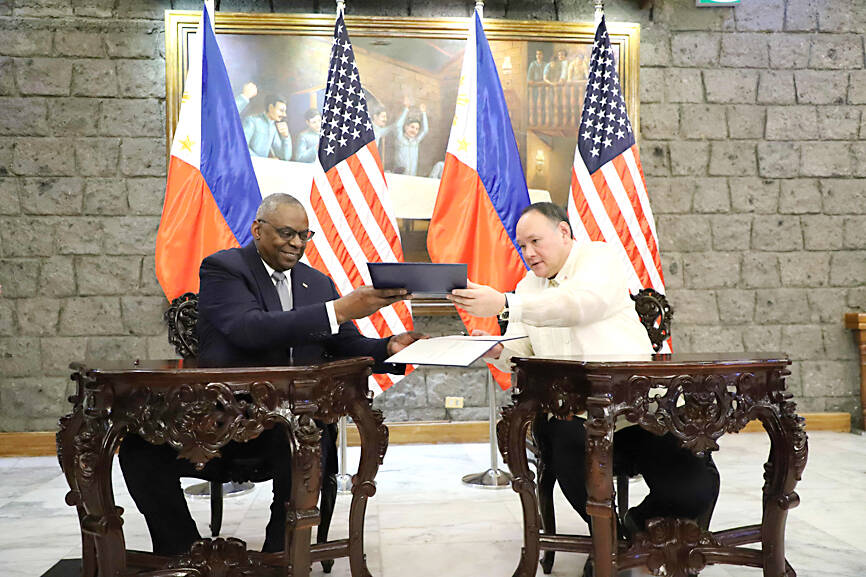US and Philippine defense chiefs signed an agreement yesterday on sharing classified military information and technology, as the long-time treaty allies deepen cooperation in a bid to counter Chinese influence in the region.
US Secretary of Defense Lloyd Austin signed the deal with his Philippine counterpart Gilberto Teodoro at the start of a visit to Manila that also included a closed-door meeting with Philippine President Ferdinand Marcos Jr.
The General Security of Military Information Agreement allows for the sharing of classified information that could benefit a US ally’s national defense, and streamlines the sale of certain classified technologies, officials said.

Photo: AFP
It would give the Philippines access to “higher capabilities and big-ticket items” from the US and “open opportunities to pursue similar agreements with like-minded nations,” Philippine Department of National Defense spokesperson Arsenio Andolong said.
Austin and Teodoro also held a ground-breaking ceremony for a combined command and coordination center inside the Philippine military’s headquarters in Manila.
“This center will enable real-time information sharing for a common operating picture. It will help boost interoperability for many, many years to come,” Austin said.
“It will be a place where our forces can work side by side to respond to regional challenges,” he added.
Philippine Chief of Staff General Romeo Brawner said the center would “enhance our ability to collaborate during crises, fostering an environment where our strengths combine to safeguard peace and security in our region.”
The Philippine Department of National Defense said Austin is due to visit the western island of Palawan today for a meeting with Filipino forces responsible for patrolling the South China Sea and defending outposts.
Austin’s visit comes as the Marcos government pushes back against Beijing’s territorial claims over most of the South China Sea and as US president-elect Donald Trump prepares to return to office.

‘UNUSUAL EVENT’: The Australian defense minister said that the Chinese navy task group was entitled to be where it was, but Australia would be watching it closely The Australian and New Zealand militaries were monitoring three Chinese warships moving unusually far south along Australia’s east coast on an unknown mission, officials said yesterday. The Australian government a week ago said that the warships had traveled through Southeast Asia and the Coral Sea, and were approaching northeast Australia. Australian Minister for Defence Richard Marles yesterday said that the Chinese ships — the Hengyang naval frigate, the Zunyi cruiser and the Weishanhu replenishment vessel — were “off the east coast of Australia.” Defense officials did not respond to a request for comment on a Financial Times report that the task group from

DEFENSE UPHEAVAL: Trump was also to remove the first woman to lead a military service, as well as the judge advocates general for the army, navy and air force US President Donald Trump on Friday fired the chairman of the Joint Chiefs of Staff, Air Force General C.Q. Brown, and pushed out five other admirals and generals in an unprecedented shake-up of US military leadership. Trump wrote in a post on Truth Social that he would nominate former lieutenant general Dan “Razin” Caine to succeed Brown, breaking with tradition by pulling someone out of retirement for the first time to become the top military officer. The president would also replace the head of the US Navy, a position held by Admiral Lisa Franchetti, the first woman to lead a military service,

Four decades after they were forced apart, US-raised Adamary Garcia and her birth mother on Saturday fell into each other’s arms at the airport in Santiago, Chile. Without speaking, they embraced tearfully: A rare reunification for one the thousands of Chileans taken from their mothers as babies and given up for adoption abroad. “The worst is over,” Edita Bizama, 64, said as she beheld her daughter for the first time since her birth 41 years ago. Garcia had flown to Santiago with four other women born in Chile and adopted in the US. Reports have estimated there were 20,000 such cases from 1950 to

CONFIDENT ON DEAL: ‘Ukraine wants a seat at the table, but wouldn’t the people of Ukraine have a say? It’s been a long time since an election, the US president said US President Donald Trump on Tuesday criticized Ukrainian President Volodymyr Zelenskiy and added that he was more confident of a deal to end the war after US-Russia talks. Trump increased pressure on Zelenskiy to hold elections and chided him for complaining about being frozen out of talks in Saudi Arabia. The US president also suggested that he could meet Russian President Vladimir Putin before the end of the month as Washington overhauls its stance toward Russia. “I’m very disappointed, I hear that they’re upset about not having a seat,” Trump told reporters at his Mar-a-Lago resort in Florida when asked about the Ukrainian